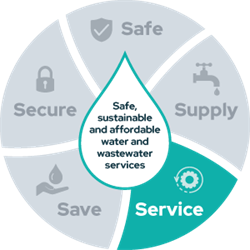Wastewater connections and disconnections
We make it easy for you to connect, disconnect and pay for your water and wastewater services.
Connections
Existing developments
Application for Approval of Plumbing and Drainage Work on Private Land
This form is to be used for:
- vacant lot in approved subdivision where there is an existing sewer junction
- re-connection of a previous sewer disconnection in the same location
No existing sewer junction
Application for Alter Council's Water or Sewer Infrastructure(PDF, 213KB)
This form is to be used for:
- new subdivision
- where there has never been a sewer connection before
Sewage ejection pump stations
Application for Sewage Ejection Pump Station(PDF, 190KB)
This form is to be used following approval for connection to Council's existing sewerage system where the sewer can't gravitate from the property to Council's sewer.
For more information call our Planning and Assets team on 02 6670 2460.
Connection guidelines
Council will advise you whether the new connection can go ahead.
It depends on a number of factors, including proximity of the property to Council's sewer, and whether or not the property is rated for sewer
A plumber may only connect to the wastewater junction point after the development and building applications have been approved and the property is rated for sewer
Section 64 Developer Charges may apply when connecting to Council's Sewer Infrastructure and must be paid before connection is permitted. Council will advise if this applies for your property
All wastewater connections must be installed according to Council's Standard Drawings and specifications
In line with plumbing standards, adequate drainage must be considered when determining the floor level relative to the sewer connection point.
Disconnections
Disconnection of the wastewater service may be required if a property is to be redeveloped and/or existing dwellings are to be demolished or removed.
Permanent sewer junction disconnection
Application for a Permanent Sewer Junction Disconnection(PDF, 213KB)
Note: Council will provide you with a quotation for the work. Permanent sewer junction disconnections are carried out by Council.
Temporary sewer junction disconnection
Application for Approval of Plumbing and Drainage Work on Private Land
Note: Temporary sewer disconnections can be carried out by a Qualified Licensed Plumber once approval from Council is received.
How to locate sewer infrastructure
Council keeps records of Work As Executed (WAE) diagrams for sewer reticulation and in most cases, can provide the location details of the connection point. See Dial Before You Dig. However, if accuracy of these locations is critical, a private survey should be arranged.
If location information provided by the Council is inaccurate, and a junction cannot be located within 2 hours of mechanical excavation Council should be contacted again for further direction. Provided the error is in Council’s information, Council will normally provide the following measures free of charge;
- Conduct a video survey of the sewer line to determine the existence and/or exact location of the junction
- Where no junction exists Council will install a junction up to the boundary trap
- Where the junction exists and the location was wrong Council would either expose the junction or pay the contractor to expose the junction in its location
How to request a new wastewater junction
If the lot does not have an established wastewater junction point, the property owner/developer will need to complete Wastewater Connection/ Disconnection/ Alteration Application form(PDF, 213KB) . A Section 68 application can be made through Council to allow the junction to be installed by a qualified plumber.
Most properties, including duplexes and triplexes, will have a single wastewater junction.
Large non-domestic properties may apply for a second wastewater junction, if it cannot be adequately serviced by one junction due to sewer capacity or because it is unable to achieve fall to the developed area of the lot or because waste needs to be separated to different catchments. The owner or applicant shall cover all costs of installing a second junction.
Sewer Ejection Pump Stations
Council is not responsible for unblocking house drains
As such, do not allow any of the following items into your sewage either directly or through a kitchen waste disposal:
- Stormwater - The unit will not function in a flood situation
- Glass
- Metal (eg utensils)
- Nappies
- Socks, rags or cloth
- Plastic objects (eg toys, utensils)
- Condoms
- Feminine hygiene products (eg sanitary napkins or tampons)
- Cotton buds
- Rocks or timber
- Kitty litter or aquarium sand
- Explosives or flammable material
- Lubricating oil or grease - Minimise the amount of cooking grease entering your system
- Strong chemicals
- Gasoline
- Paints or paint thinners
Property Owners responsibilities relating to wastewater
It is the owners responsibility to maintain internal sewer or sanity drainage in good working order. This includes but is not limited to:
- Ensuring internal installation, upgrades or extension meet Australian Standards
- Ensuring damaged or blocked plumbing is diligently repaired in a timely manner
- Contacting Council for repairs or clearing blockages in public sewers
- Ensuring stormwater and runoff water does not enter the sewerage system
- Ensuring substances that are discharged to the sewer are not prohibited and will not create obstruction or blockages in public or internal sewers
- Knowing the location of the property sewer inspection shaft and keeping it clear and visible
- Keeping sewer easements accessible to Council at all times and not placing or building any structure within the easement, including trees, without Council's prior approval.
